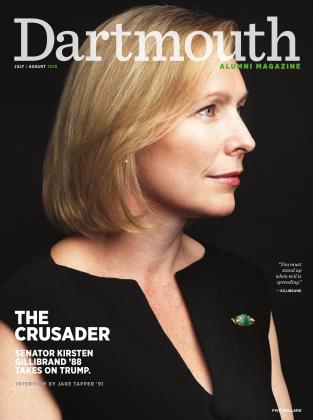EUREKA!
CAMPUS
NEW FINDINGS AND RESEARCH
Same Wavelength
Friends think alike.
The roots of friendship run deeper than researchers had suspected, reports professor of psychological and brain sciences Thalia Wheatley in Nature Communications. Wheatley, along with coauthors Carolyn Parkinson, Adv’16, and Tuck professor Adam Kleinbaum, surveyed 279 first-year M.B.A. students to map their social networks and determine degrees of connectivity between friends. The researchers then used fMRI scanning to measure the neural responses of 42 participants as they watched videos. Those who were close friends demonstrated the greatest similarities in brain activity. “We can see that neural responses are more similar among friends,” says Wheatley. “Now we get to ask: Why is that so?” The researchers plan a follow-up study to test whether they can predict which first-year students will become friends.
Heads Up, Phones Down
Smartphones impair memory.
»> Shooting and sharing smartphone photos reduces our ability to recall the moments we’ve photographed, according to a new study in the Journal of Experimental Social Psychology. Lead researcher Emma Templeton, a graduate student in the psychological and brain sciences department, asked a few hundred participants to tour a church and take notes on what they saw. Part of the group was told to shoot photos on smart devices. Others had no gadgets. When Templeton gave the group a surprise quiz a week later, she found that the photo takers weren’t able to recall details as well as those who relied solely on their memories. “Ironically, our results suggest that using media to preserve these moments may prevent people from fully experiencing them in the first place,” writes Templeton.
 View Full Issue
View Full Issue
More From This Issue
-
 The DAM Interview
The DAM InterviewKirsten Gillibrand ’88
July | August 2018 By Jake Tapper ’91 -
 Books
BooksThe Book That Changed My Life
July | August 2018 By GEORGE M. SPENCER -

The King Of Broadway
July | August 2018 By Jennifer Wulff ’96 -
 Personal History
Personal HistoryThe Evolved Eater
July | August 2018 By NICK TARANTO ’06 -
 YOUR TURN
YOUR TURNYOUR TURN
July | August 2018 -
 Campus
CampusA New VP for Alumni Relations
July | August 2018 By ABIGAIL DRACHMAN-JONES ’03
Notebook
-
 notebook
notebookBY THE NUMBERS
MARCH | APRIL 2017 -
 notebook
notebookBY THE NUMBERS
JULY | AUGUST 2017 -
 notebook
notebookJoy to the World
JANUARY | FEBRUARY 2022 -
 notebook
notebookComputer Graphics
NOVEMBER | DECEMBER 2017 By Ishaan H. Jajodia ’20 -
 notebook
notebookHow to Improve Your Memory
MARCH|APRIL 2019 By James Napoli -
 notebook
notebookGeeta Anand ’89
JANUARY | FEBRUARY 2022 By Sean Plottner

